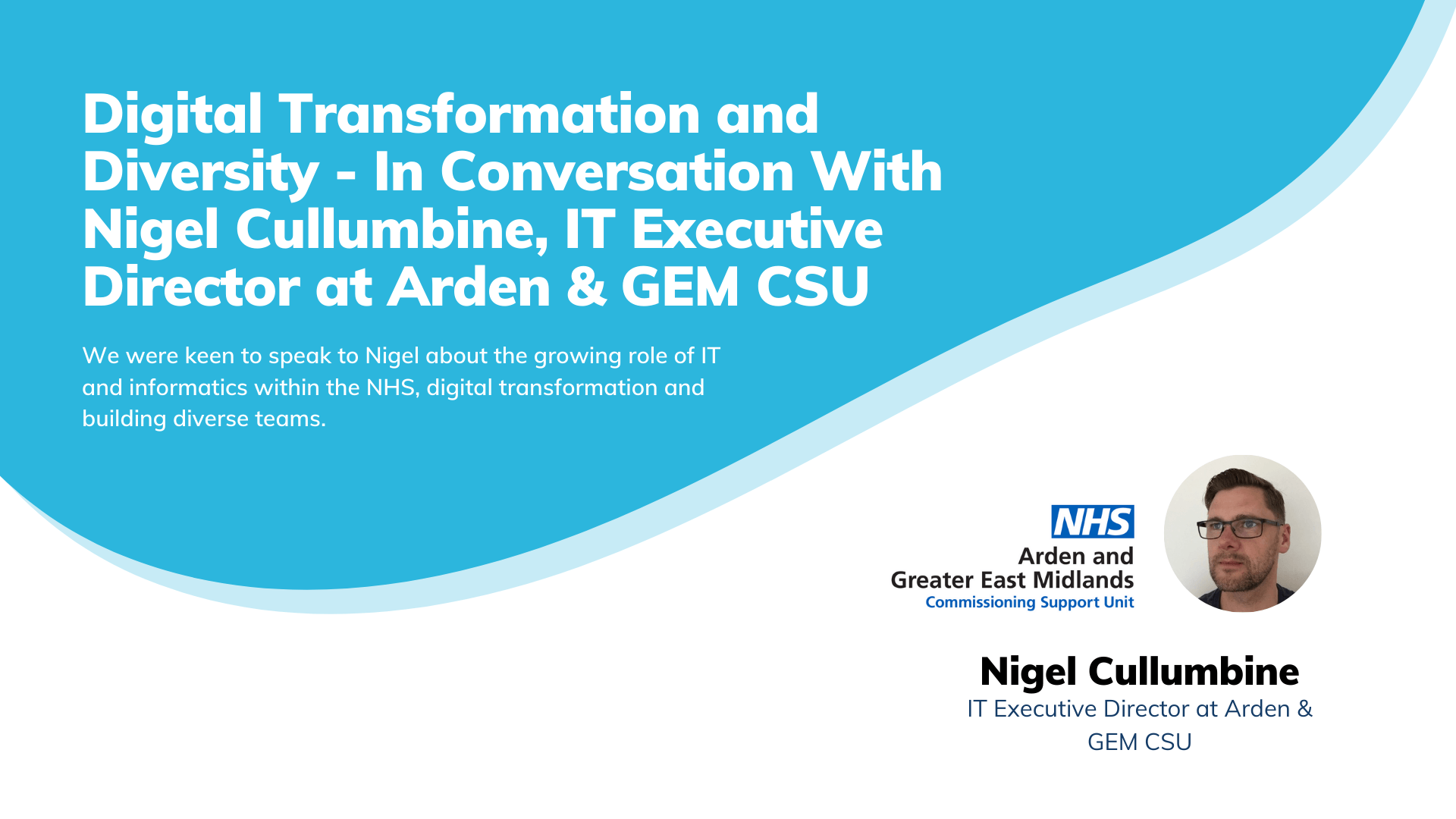

As the Executive IT Director at Arden and GEM CSU, Nigel sits on the board of the CSU and manages the full spectrum of IT Services for both corporate IT support and GP IT Support from service desk all the way through to infrastructure.
We were keen to speak to Nigel about the growing role of IT and informatics within the NHS, digital transformation and building diverse teams.
For many, Digital transformation has become a bit of a buzzword. With full-scale home working just a button’s click away for most, it’s easy to forget that larger, more monolithic organisations’ transformation projects can take years, sometimes decades.
In the NHS, one of the world’s largest employers, decades worth of transformation has happened over a matter of months due, in part, to the COVID-19 pandemic. Transformation that has seen many thousands of NHS staff moved out of hospitals and traditional settings and into their homes.
Nigel, who took his role just three months before COVID struck, reflects on those early days as being a period of massive culture change.
“At the time it was just another major incident. So within days and weeks, we provisioned for home working for all of our staff and supported our customers. And the technology behind it was relatively straightforward. The big change is the cultural change, the business change that goes with sitting in your dining room, or your spare bedroom, or wherever you happen to be.”
Working from his Motorhome on his driveway, Nigel has perhaps one of the most interesting remote work set ups we’ve seen. Regardless, it should stand as a testament to the sheer range of different working situations people found themselves in almost overnight.
“The biggest journey and change we’ve seen is not the provision of technology but how we now support our staff and our customer base in using that technology and making the most of it; staying together as a unit and a team to deliver to our customers. That’s been the hardest challenge.”
While COVID was stimulating a remote working renaissance, it was also quietly turning the spotlight towards Informatics and highlighting its role as a transformer as well as a supporter.
“Historically, IT was seen as a support, back-office function. It’s now rapidly changing.”
More and more, technology is not just being seen as a means to an end but as a transformative stimulant that can unearth inefficiencies and unlock new potential.
“IT has to be an enabler to change. The transformation brought about by the adoption of technology can support new pathways; it’s where we can get efficiencies within systems.”
The role of CIO has been key for many organisations in their pursuit of digital transformation. Having that champion at the highest level is key, but for the NHS – which seems to struggle for CIO representation at the highest level – it is perhaps even more important to have someone with the ability to articulate the benefits of new developments when, at the bottom line, it’s patient care that truly matters.
“a CIO needs to sell that, you know, it doesn’t happen by chance. You’ve got to articulate the benefits in any given setting and quantify that to have that all-important seat at the table, to influence how an organisation functions.”
Change is happening rapidly in the NHS. Over the last 10 months, we have seen greater acceleration than the previous four or five years prior to that. This, although partly borne out of the necessity to move at pace and mobilise a service that would provide care in a new context, has been driven by an understanding that the NHS needs to address nuances and subtleties around care and digital health.
“Traditionally, it’s been a transactional service and we’re great at delivering to a transactional need. It’s no longer the case that just delivering very well to those services will give the customers what they need. In a GP setting, for example, we need to truly understand the clinical user interface and patient needs in order to maximise the online consultation experience and benefit.”
Crucially, for Nigel, it’s about forming a partnership with the various parts of the NHS rather than falling into the trap of investing in teams only to silo them away from the services they’re there to support.
“We need to support our customers who have an in-house digital or IT team; to walk alongside them and work for hand in hand with them on that digital journey.”
Creating change in this space would be a difficult task without the firm foundations of a progressive culture.
For those who have been following my posts on Linkedin and Twitter, you’ll know that I’ve been proactively seeking out advocates for diversity within the NHS.
Nigel, who has been very mindful of addressing unconscious bias, believes it’s about finding a balance.
“I’m going through consultation and restructure right now; the blend of individuals you get in a team and the ideas generation that comes from diversity in a team is really powerful and really important. Otherwise, you’ll just get what you’ve always had before and that won’t take you forward in any way. So it is something we discuss in my management team meetings in terms of how we adapt and how we approach recruitment. It’s something we all continually have to be mindful of as we go forward.”
Finding this balance and addressing the roadblocks to creating a team that thinks differently is key to innovation and for what Nigel hopes for the future of technology in the NHS.
“The best meetings I have are where someone throws something in that changes the way we look at a situation. When that happens you know you’ve got it right, because the strength of what we do here comes from the breadth, depth and diversity of the people that we work with.”